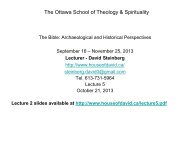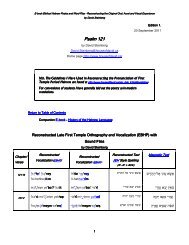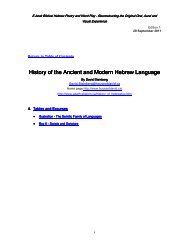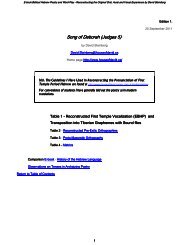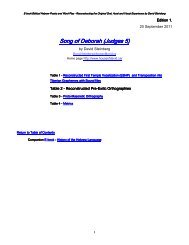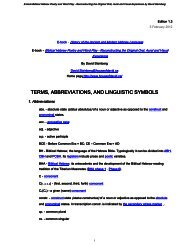Biblical Hebrew Poetry - House of David Steinberg
Biblical Hebrew Poetry - House of David Steinberg
Biblical Hebrew Poetry - House of David Steinberg
Create successful ePaper yourself
Turn your PDF publications into a flip-book with our unique Google optimized e-Paper software.
8<br />
E-book<br />
<strong>Biblical</strong> <strong>Hebrew</strong> <strong>Poetry</strong> and Word Play - Reconstructing the Original Oral, Aural and Visual Experience by <strong>David</strong> <strong>Steinberg</strong><br />
Box 2 - Wordplay in the <strong>Hebrew</strong> Bible<br />
have been something like /waʾayˈbâ/ (EBHP) > /waʾệˈbâ/, which might have been completed as<br />
early as the 6 th century BCE, which developed into TH /wәʾẹˈba/ [wәʾẹːˈvɐː] by the ninth century<br />
CE. The development <strong>of</strong> the pronunciation <strong>of</strong> חוה from [ħɐwˈwɔː] [TH] to [xɐˈvɔ], and ואיבה from<br />
[wәʾẹːˈvɐː] [TH] to [wәʾẹˈvɐ],would have taken place in Europe in the Middle Ages at least 1,500<br />
years later.<br />
(4) Assumption for common root meaning.<br />
a) There were two roots, both spelled<br />
led עלם<br />
but pronounced distinctively differently in the First<br />
עלם<br />
Temple period.<br />
(see) √ġlm – root meaning = to be agitated, strong. This is probably the root <strong>of</strong> the עלם<br />
nouns עלמה/עלם = boy/girl.<br />
√ c lm – root meaning = to conceal = עלם<br />
Although one might postulate, on the basis <strong>of</strong> TH and modern pronunciation, that all children are<br />
devious and conceal what they can, this would have no basis in historical linguistics.<br />
b) בָּחוּר occurs in Eccl. 11:9 with the meaning <strong>of</strong> 'young man' and in Ps. 89:20 as the passive<br />
participle meaning 'chosen'. One might think that there was an association i.e. that בָּחוּר in Eccl.<br />
11:9 refers to a select or favored youth. However, it is probable that the two are unrelated and<br />
would have constituted a Minimal Pair in pre-exilic <strong>Hebrew</strong> i.e. */baˈḫūr<br />
ūr/ : */baˈḥūr<br />
ūr/ meaning<br />
respectively youth and chosen 10 .<br />
c) In the <strong>Hebrew</strong> Bible נַחֲלָה = “inalienable, hereditary property”, נַחַל = “stream, wadi”, and<br />
possibly date palms”. Given the fundamental importance <strong>of</strong> water for fertility one might associate<br />
the two words. However, historically they were unrelated. In EBHP the first was pronounced<br />
/naḥaˈlâ/ [nɐħɐˈlɐː] and the second /ˈna<br />
naḫl/ [ˈnɐxl] or [ˈnɐxәl].



